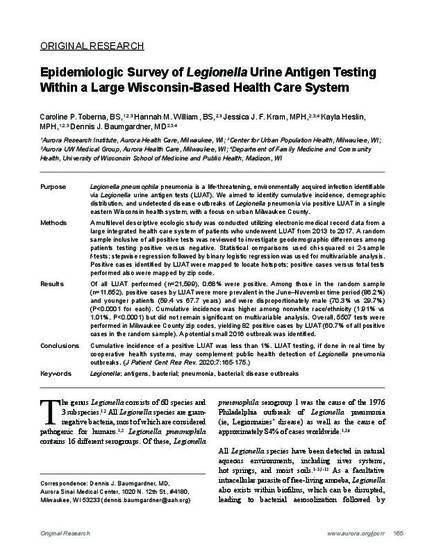
- Legionella; antigens,
- bacterial; pneumonia,
- bacterial; disease outbreaks
Purpose: Legionella pneumophila pneumonia is a life-threatening, environmentally acquired infection identifiable via Legionella urine antigen tests (LUAT). We aimed to identify cumulative incidence, demographic distribution, and undetected disease outbreaks of Legionella pneumonia via positive LUAT in a single eastern Wisconsin health system, with a focus on urban Milwaukee County.
Methods: A multilevel descriptive ecologic study was conducted utilizing electronic medical record data from a large integrated health care system of patients who underwent LUAT from 2013 to 2017. A random sample inclusive of all positive tests was reviewed to investigate geodemographic differences among patients testing positive versus negative. Statistical comparisons used chi-squared or 2-sample t-tests; stepwise regression followed by binary logistic regression was used for multivariable analysis. Positive cases identified by LUAT were mapped to locate hotspots; positive cases versus total tests performed also were mapped by zip code.
Results: Of all LUAT performed (n = 21,599), 0.68% were positive. Among those in the random sample (n = 11,652), positive cases by LUAT were more prevalent in the June–November time period (86.2%) and younger patients (59.4 vs 67.7 years) and were disproportionately male (70.3% vs 29.7%) (P < 0.0001 for each). Cumulative incidence was higher among nonwhite race/ethnicity (1.91% vs 1.01%, P < 0.0001) but did not remain significant on multivariable analysis. Overall, 5507 tests were performed in Milwaukee County zip codes, yielding 82 positive cases by LUAT (60.7% of all positive cases in the random sample). A potential small 2016 outbreak was identified.
Conclusions: Cumulative incidence of a positive LUAT was less than 1%. LUAT testing, if done in real time by cooperative health systems, may complement public health detection of Legionella pneumonia outbreaks.
Toberna CP, William HM, Kram JJ, Heslin K, Baumgardner DJ. Epidemiologic survey of Legionella urine antigen testing within a large Wisconsin-based health care system. J Patient Cent Res Rev. 2020;7:165-75. doi: 10.17294/2330-0698.1721
